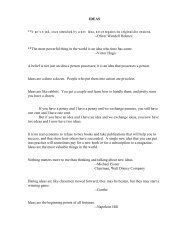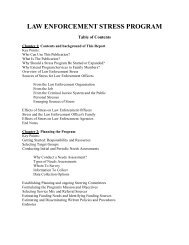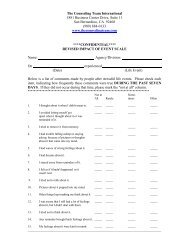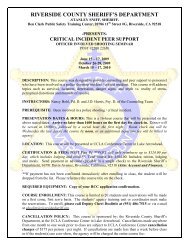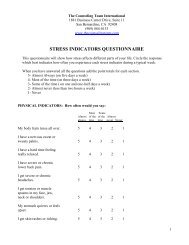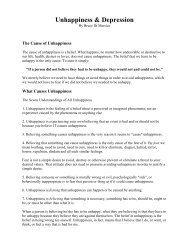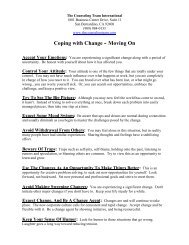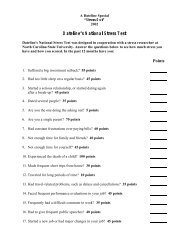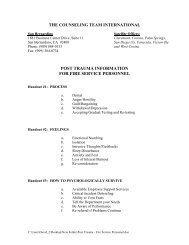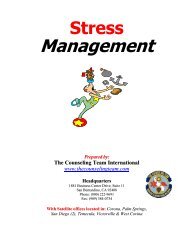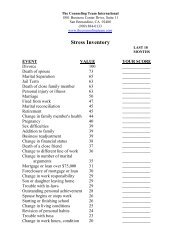Psychological Fitness For Duty Evaluation Guidelines
Psychological Fitness For Duty Evaluation Guidelines
Psychological Fitness For Duty Evaluation Guidelines
You also want an ePaper? Increase the reach of your titles
YUMPU automatically turns print PDFs into web optimized ePapers that Google loves.
The Counseling Team International1881 Business Center Dr. Suite 11San Bernardino, CA 92408(909) 884-0133www.thecounselingteam.com<strong>Psychological</strong> <strong>Fitness</strong>-for-<strong>Duty</strong> <strong>Evaluation</strong> <strong>Guidelines</strong>Ratified by the IACP Police <strong>Psychological</strong> Services SectionLos Angeles, California, 2004PurposeThe IACP <strong>Psychological</strong> Services Section developed these guidelines for use by public safetyagencies and mental health examiners. These guidelines are not intended to establish a rigidstandard of practice for psychological fitness-for-duty evaluations (FFDEs). Instead, they areintended to reflect the commonly accepted practices of the section members and the agenciesthey serve. Each of the guidelines may not apply in a specific case or in all situations. Thedecision as to what is or is not done in a particular instance is ultimately the responsibility ofeach agency and professional examiner.DefinitionA psychological FFDE is a formal, specialized examination of an incumbent employee thatresults from (1) objective evidence that the employee may be unable to safely or effectivelyperform a defined job and (2) a reasonable basis for believing that the cause may be attributableto psychological factors. The central purpose of an FFDE is to determine whether the employeeis able to safely and effectively perform his or her essential job functions.Threshold Considerations1. Referring an employee for an FFDE is indicated whenever there is an objective andreasonable basis for believing that the employee may be unable to safely or effectively performhis or her duties due to psychological factors. An objective basis is one that is not merelyspeculative but derives from direct observation, credible third-party report, or other reliableevidence.2. FFDEs necessarily intrude on the personal privacy of the examinee and therefore should beconducted after the employer has determined that other options are inappropriate or inadequatein light of the facts of a particular case. The FFDE is not to be used as a substitute fordisciplinary action.3. If an employer is uncertain whether its observations and concerns warrant an FFDE, it maybe useful to discuss them with the employer's examiner or legal counsel prior to mandating theexamination.
Examiner Qualifications4. In light of the nature of these evaluations and the potential consequences to the agency, theexaminee, and the public, it is important for examiners to perform FFDEs with maximumattention to the relevant legal, ethical, and practice standards, with particular concern forstatutory and case law applicable to the employing agency's jurisdiction. Consequently, theseevaluations should be conducted only by a qualified mental health professional. At a minimum,the examiner should be a licensed psychologist or psychiatrist with education, training, andexperience in the diagnostic evaluation of mental and emotional disorders; possess training andexperience in the evaluation of law enforcement personnel; be familiar with the policepsychology literature and the essential job functions of the employee being evaluated; be familiarwith relevant state and federal statutes and case law, as well as other legal requirements relatedto employment and personnel practices (e.g., disability, privacy, third-party liability); and satisfyany other minimum requirements imposed by local jurisdiction or law.5. When an FFDE is known to be in the context of litigation, arbitration, or anotheradjudicative process, the examiner should have particular training and experience in forensicpsychological or psychiatric assessment. In such cases, the examiner should be prepared bytraining and experience to qualify as an expert in any related adjudicative proceeding.Identifying the Client6. The client in an FFDE is the employer, not the employee being evaluated, and this factshould be communicated to all involved parties at the outset of the evaluation. Nevertheless, theexaminer owes an ethical duty to both parties to be fair and impartial and to honor theirrespective legal rights and interests. Other legal duties also may be owed to the examinee as aresult of statutory or case law unique to the employer's or the examiner's jurisdiction.7. Examiners should decline to accept an FFDE referral when personal, professional, legal,financial, or other interests or relationships could reasonably be expected to (a) impair theirobjectivity, competence, or effectiveness in performing their functions or (b) expose the personor agency with whom the professional relationship exists to harm or exploitation (e.g.,conducting an FFDE on an employee who had previously been a confidential counseling ortherapy client, evaluating an employee with whom there has been a business or significant socialrelationship). Similarly, an FFDE examiner should be mindful of potential conflicts of interestrelated to recommendations or the provision of services following the evaluation (e.g., referringan examinee to oneself for subsequent treatment). If such conflicts are unavoidable or deemed tobe of minimal impact, the examiner should nevertheless disclose the potential conflict to allaffected parties.Referral Process8. It is desirable that employers have FFDE policies and procedures that define such matters ascircumstances that would give rise to an FFDE referral, mechanisms of referral and examinerselection, any applicable report restrictions, sharing results with the examinee, and other relatedmatters.9. The employer's referral to the examiner should include, at a minimum, a description of theobjective evidence rising to concerns about the employee's fitness for duty, and any particularquestions that the employer needs the examiner to address. In most circumstances, this referralshould be documented in writing.
10. In the course of conducting the FFDE, it is usually necessary for the examiner to receivebackground and collateral information regarding the employee's past and recent performance,conduct, and functioning. The information might include, but is not limited to, performanceevaluations, previous remediation efforts, commendations, testimonials, internal affairsinvestigations, formal citizen or public complaints, use-of-force incidents, reports related toofficer-involved shootings, civil claims, disciplinary actions, incident reports of any triggeringevents, medical records, or other supporting or relevant documentation related to the employee'spsychological fitness for duty. In some cases, examiners may ask the examinee to providemedical/psychological treatment records and other data for the examiner to consider.11. When some portion of the information requested by an examiner is unavailable or iswithheld, the examiner must judge the extent to which the absence of such information may limitthe reliability or validity of his or her findings and conclusions before deciding to proceed. If theexaminer proceeds with the examination, the subsequent report should include a discussion ofany such limitations judged to exist.Informed Consent & Authorization12. An FFDE requires the informed consent of the examinee to participate in the examination.At a minimum, informed consent should include a description of the nature and scope of theevaluation; the limits of confidentiality, including any information that may be disclosed to theemployer without the examinee's authorization; the potential outcomes and probable uses of theexamination; and other provisions consistent with legal and ethical standards for mental healthevaluations conducted at the request of third parties.13. In addition to obtaining informed consent, the examiner should obtain writtenauthorization from the employee to release the examiner's findings and opinions to the employer.If such authorization is denied, or if it is withdrawn once the examination commences, theexaminer should be aware of any legal restrictions in the information that may be disclosed to theemployer without valid authorization. With valid written authorization, an examiner is free todisclose unrestricted information to the employer.<strong>Evaluation</strong> Process14. Depending on the referral question and the examiner's clinical judgment, an FFDE typicallyrelies on multiple methods and data sources in order to optimize the reliability and validity offindings. The range of methods and data sources frequently includes a review of the requestedinformation (e.g., personnel records, medical records, incident reports or memos); psychologicaltesting using assessment instruments (e.g., personality, psychopathology, cognitive, specialized)appropriate to the referral question(s); a comprehensive, face-to-face clinical interview; collateralinterviews with relevant third parties if deemed necessary by the examiner; and referral to, andconsultation with, a specialist if deemed necessary by the examiner.15. Prior to conducting collateral interviews of third parties, care should be taken to obtaininformed consent from the employer, the examinee, or from the third party, as appropriate. Thisshould include, at a minimum, explanation of the purpose of the interview, how the informationwill be used, and any limits to confidentiality.
Report and Recommendations16. Customarily, the examiner will provide a written report to the client agency that contains adescription of the rationale for the FFDE, the methods employed, and whenever possible, aclearly articulated opinion that the examinee is presently fit or unfit for unrestricted duty. Thecontent of the report should be guided by consideration of the terms of informed consent, theemployee's authorization, the pertinence of the content to the examinee's psychological fitness,the employing agency's written policies and procedures, the applicable terms of any laboragreement, and relevant law.17. When an examinee is found unfit for unrestricted duty, the report should contain,whenever possible, the following minimum information unless prohibited by law, agency policy,labor agreement, the terms of the employee's disclosure authorization, or other considerations: adescription of the employee's functional impairments or job relevant limitations; and an estimateof the likelihood of, and time frame for, a return to unrestricted duty, and the basis for thatestimate.18. It is recognized that some examiners may be asked to provide opinions regardingnecessary work restrictions, accommodations, interventions, or causation. Nevertheless, thedetermination as to whether or not a recommended restriction or accommodation is reasonablefor the specific case and agency is a determination to be made by the employer, not theexaminer.19. The examiner's findings and opinions are based on all data available at the time of theexamination. If additional relevant information is obtained after completion of the FFDE or if itis determined that the original evaluation was based on inaccurate information, the employermay request that the examiner reconsider his or her conclusions in light of the additionalinformation. Reconsideration or re-evaluation also may be indicated in circumstances where anemployee, previously deemed unfit for duty, subsequently provides information suggesting his orher fitness has been restored.20. Decisions concerning whether and how the findings and opinions resulting from the FFDEare to be communicated to the examinee should be disclosed to all parties in advance of theexamination whenever possible. Such decisions should be governed by standards of professionalethics, clinical considerations, statutory and case law, and any prior agreements with theemployer and examinee.21. Some agencies may find differences of opinion between or amongst the examiner andother health care professionals. Employers should be prepared to address these differences if theyarise. In such cases, the employer may find it helpful to consider (a) any differences in theprofessionals' areas of expertise and knowledge of the employee's job and work environment, (b)the objective bases for each opinion, and (c) whether the opinion is contradicted by informationknown to or observed by the employer.22. Agencies should handle FFDE reports in conformance with legal standards governing anemployer's treatment of employee medical records.



